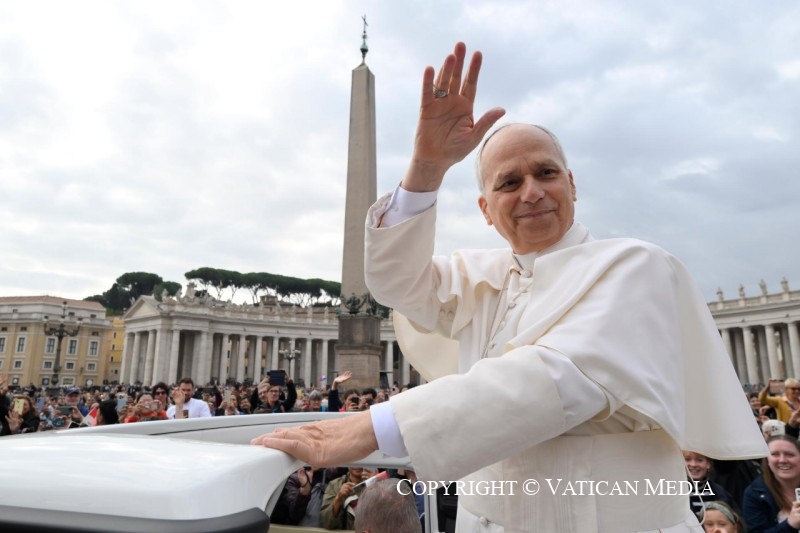Pope: The Resurrection “brings relief from sadness”, a malaise of our time
At the general audience, during his Jubilee catechesis, Leo XIV offered his thoughts about the Gospel of the disciples on the road to Emmaus. “The gesture of breaking bread reopens the eyes of the heart,” he said. At the end, he invited the faithful to renew their “active cooperation in the Church's mission." He also remembered Saint John Paul II on his liturgical feast day, saying that “47 years ago, in this square, he urged the world to open itself to Christ.”
Vatican City (AsiaNews) – Bad weather and rain did not deter thousands of people from flocking to St Peter's Square for today’s general audience with Pope Leo XIV.
A colourful sea of umbrellas attended the pontiff's Jubilee catechesis on the theme: The Resurrection of Christ, the answer to human sadness.
“Today we will reflect on how Christ’s resurrection can heal one of the malaises of our time: sadness,” the pontiff said.
At the centre of today's reflection was Luke's Gospel on the disciples of Emmaus (24:13-29).
During his greetings at the end of the audience, Leo XIV noted that “the month of October invites us to renew our active cooperation in the mission of the Church.”
To this end, he urged the sick, newly-weds, youth and students to "be missionaries of the Gospel, offering [...] concrete support to those who dedicate their existence to the evangelisation of peoples."
He proposed doing this "with the strength of prayer, with the potential of married life, and with the fresh energies of youth”.
He also mentioned the liturgical memorial of Saint John Paul II.
"Exactly 47 years ago, in this square, he urged the world to open itself to Christ. This appeal is still valid today: we are all called to make it our own," Leo said.
In the catechesis, read at the beginning, the pontiff spoke of the resurrection of Jesus as “an explosion of life and joy that changed the meaning of reality itself, from negative to positive”.
Despite its explosive implications, it occurred in a "gently, hidden, one might say humbly” way, the pope explained, one that can bring relief from sadness, which is “one of the malaises of our time," which “accompanies the days of many people.”
This inner relapse seems to obscure “any impetus to joy,” he said. Indeed, sadness makes life seem like “a directionless and meaningless journey.” This is what the two disciples of Emmaus experienced.
“Disappointed and discouraged, they leave Jerusalem, leaving behind the hopes they held in Jesus, who has been crucified and entombed,” Leo explained.
Such a “paradox” is inherent in their behaviour. “[T]his sad journey of defeat and return to ordinary life occurs on the same day as the victory of light, of the Pasch,” he added.
Yet, when “It seems that all is lost”, they are joined by a “traveller” whom they do not recognise. “Sadness clouds their gaze,” the pope noted.
They listened while he “rebukes them” for being “‘foolish … and slow of heart to believe that all the prophets have declared!’ (v.25)”; as a “The warmth of hope is rekindled” in the two disciples from Emmaus.
They recognised him later, when the “traveller”, the Risen Jesus, took the bread, broke it and offered it. “Immediately, joy is rekindled, energy flows back into their weary limbs, and gratitude returns to their memory” since “The gesture of the breaking of the bread reopens the eyes of the heart”.
“Jesus did not rise in words, but in deeds,” said Pope Leo XIV. Emmaus “is a gentle reminder to us when the going gets tough.”
The Risen Jesus “radically changes perspective”, filling the void caused by sadness with hope. “On the paths of the heart, the Risen One walks with us and for us.”
Acknowledging this “means to change one’s outlook on the world: to return to the light to recognize the Truth that has saved us, and that saves us.”
26/10/2022 13:25







.png)










